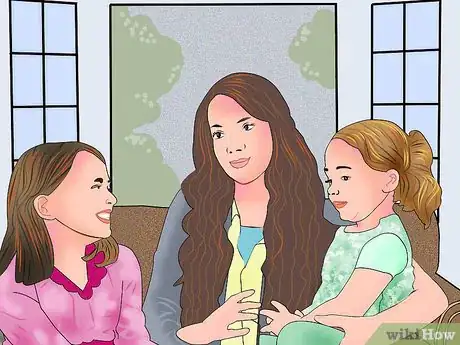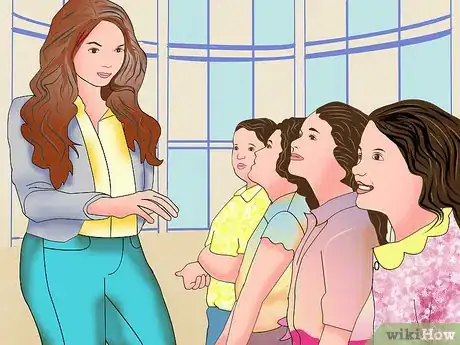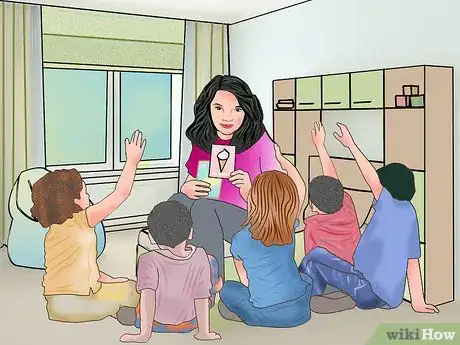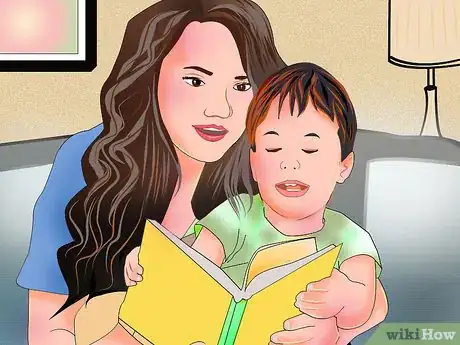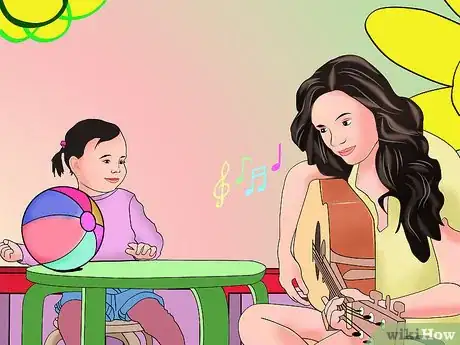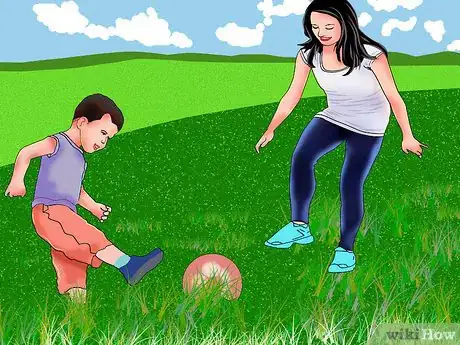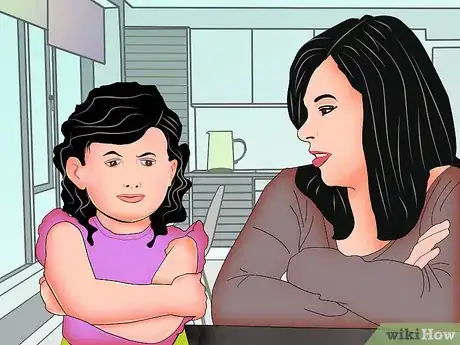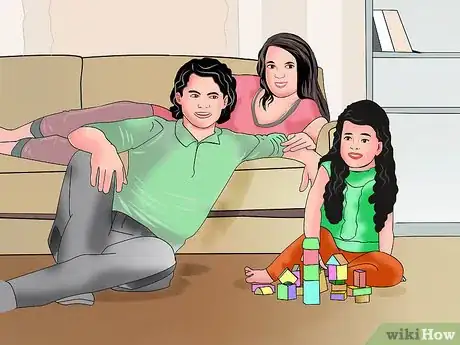This article was co-authored by Michelle Shahbazyan, MS, MA. Michelle Shahbazyan is the Founder of The LA Life Coach, a concierge life, family, and career coaching service based in Los Angeles, California. She has over 10 years of experience with life coaching, consulting, motivational speaking, and matchmaking. She has a BA in Applied Psychology and an MS in Building Construction and Technology Management from Georgia Tech University, and a MA in Psychology with an emphasis on Marriage and Family Therapy from Phillips Graduate University.
There are 8 references cited in this article, which can be found at the bottom of the page.
This article has been viewed 35,976 times.
Maybe you haven't spent a lot of time around children, and you are looking for some pointers on how to interact with them. Or maybe an important person in your life has a child that you would like to bond with. Whatever your reason, it is a great idea to learn to be good with young children. After all, they are people, too! When interacting with children, remember to treat them kindly. It also doesn't hurt to be ready to have fun!
Steps
Communicating Effectively
-
1Listen carefully. If you are looking to bond with a child, start by paying attention when they speak. Kids are just finding their voices, and what they are saying is very important to them. Actively listen when a young child is speaking to you.[1]
- One way to demonstrate that you are listening is to make eye contact. You can also physically indicate that you are paying attention by bending down so that you and the child are on the same level.
- Ask questions as the child is talking. This will let them know that you are interested and engaged in the conversation.
-
2Use positive words. Kids need reassurance. When you are having a conversation with a child, try to keep both your words and your tone of voice positive. Avoid sounding judgmental. Try to make them feel like they are a valuable contributor to your conversation.[2]
- Use more "do" words than "don't" words. For example, say "I like it when you hold my hand crossing the street" instead of, "Don't cross the street without holding my hand." The first sentence will sound more positive and reassuring to a child.
- Use phrases that will give the child permission to elaborate. Try saying things such as, "Tell me more." Or, "That's interesting! Why is that?"
Advertisement -
3Speak to kids, not at them. Much like adults, kids do not respond well if you speak in a condescending tone. Try to give a child the same consideration and respect that you would give a friend. Make kids an active part of the conversation, instead of talking at them.
- For example, don't talk about children as though they are not there. Speak directly to them. Instead of saying to your friend, "Wow, Kevin seems upset!", try saying directly to the child, "Kevin, you seem upset. Can I help you with something?"
-
4Consider their opinions. A great way to make a child feel valued is to ask for their opinion. You can definitely guide their choices by providing them with limited options, but by offering choices, you are showing respect. You can also ask a child how they feel about certain activities, or ask them about their day.
- Try offering choices, such as "Sam, would you like carrots or celery with your lunch?". You could also say, "Sue, would you rather play Go Fish or Crazy Eights?"
-
5Be aware of your body language. Children pick up on physical cues. Notice what your body language is saying. For example, many people lose patience when talking to children. If that happens to you, avoid letting it show in your body language. Avoid rolling your eyes or shaking your head.
- Smile a lot. This will make the child feel more comfortable and safe.
Finding Fun Activities
-
1Use your imagination. Finding a fun activity is a great way to bond with a child. Let the child's imagination be your guide. Ask them what type of adventure they would like to have. Then imagine that you are off on an adventure to the moon. For example, you could build a "spaceship" out of a cardboard box and take an amazing journey.[3]
- Kids love to play pretend. Be willing to participate in the games they come up with. They might want to pretend they are at "work" or playing in a major league baseball game. Being imaginative with kids is fun for both of you.
-
2Read books. Having story time is a way for kids to both have fun and learn. Try reading out loud to small children. Enhance the story by including some funny voices or other sound effects.[4]
- If the child is learning (or knows how) to read, have them alternate pages with you as you read aloud. This will make reading more of a team activity.
-
3Listen to music. Music is an important part of a child's development, and it is also a lot of fun. Try singing songs with kids. Songs that have easy melodies and a repeating chorus are great choices.
- If you have any musical instruments handy, let the child take a turn playing them. Kids love to try out the keys on the piano, and they especially love to bang on drums.
-
4Play games. Games are a great way for you and the child with to be active together. You can play games that have set rules (think easy board games or card games) or you and the child can invent a game together. Whichever game you choose, make sure to congratulate the child when he does well.[5]
- Games can also be great teaching tools. Try looking for ones that teach skills like counting for younger kids. If the child is older, there are many great "brain teaser" games that you can purchase.
-
5Take a field trip. Kids love to go new places. For them, almost anywhere new can be an adventure. If you have the opportunity, take them to a nearby children's museum. There will be lots of interactive exhibits that will be a lot of fun for both of you.[6]
- If you don't have access to museums or other attractions, you can make going to the neighborhood playground seem like a special trip. Be enthusiastic, and when you get to the park, be willing to play!
Understanding Children's Emotions
-
1Notice their reactions. When interacting with kids, it is important to be aware that they sometimes do not express their feelings with clear words. Instead, try to watch their reactions during conversations or activities. There are important indicators that will let you know how a kid feels about something. [7]
- Remember that different kids will have different reactions to stimuli. Some children will need (or want) more attention, others will require (or want) less.
- Pay attention to facial expressions, body language, and tone of voice to gauge how a child is reacting to something.
-
2Pay attention to their activity level. Kids don't have the same schedule as adults. They are more prone to short bursts of intense activity with longer periods of rest. Being aware of whether they seem tired or bored is an important way to help a child feel comfortable around you.[8]
- If a child is more active, follow their lead and participate in their play. If a child is quieter, try to entice them with your own ideas.
-
3Spend time together. Quality time is one of the best ways that you can make a positive influence on a child. It is an important way get to know one another, and to enhance your relationship. Make it a point to spend time doing activities that the child will enjoy.[9]
- Ideas for quality time include listening to music, readings books, and playing games.
-
4Build their self-esteem. Kids are in the process of developing their personalities. Your positive reassurance is one of the best ways to increase their confidence and help them to grow. Offer them positive words and encouragement during a variety of activities.[10]
- If you are singing a song, tell them how much fun you are having. If you play a game and they win, tell them that they did a great job. Positive reinforcement is important, and really easy to offer.
Expert Q&A
Did you know you can get expert answers for this article?
Unlock expert answers by supporting wikiHow
-
QuestionHow do you interact with young children?
 Michelle Shahbazyan, MS, MAMichelle Shahbazyan is the Founder of The LA Life Coach, a concierge life, family, and career coaching service based in Los Angeles, California. She has over 10 years of experience with life coaching, consulting, motivational speaking, and matchmaking. She has a BA in Applied Psychology and an MS in Building Construction and Technology Management from Georgia Tech University, and a MA in Psychology with an emphasis on Marriage and Family Therapy from Phillips Graduate University.
Michelle Shahbazyan, MS, MAMichelle Shahbazyan is the Founder of The LA Life Coach, a concierge life, family, and career coaching service based in Los Angeles, California. She has over 10 years of experience with life coaching, consulting, motivational speaking, and matchmaking. She has a BA in Applied Psychology and an MS in Building Construction and Technology Management from Georgia Tech University, and a MA in Psychology with an emphasis on Marriage and Family Therapy from Phillips Graduate University.
Matchmaker, The LA Life Coach
-
QuestionHow do I teach my child conversation skills?
 Michelle Shahbazyan, MS, MAMichelle Shahbazyan is the Founder of The LA Life Coach, a concierge life, family, and career coaching service based in Los Angeles, California. She has over 10 years of experience with life coaching, consulting, motivational speaking, and matchmaking. She has a BA in Applied Psychology and an MS in Building Construction and Technology Management from Georgia Tech University, and a MA in Psychology with an emphasis on Marriage and Family Therapy from Phillips Graduate University.
Michelle Shahbazyan, MS, MAMichelle Shahbazyan is the Founder of The LA Life Coach, a concierge life, family, and career coaching service based in Los Angeles, California. She has over 10 years of experience with life coaching, consulting, motivational speaking, and matchmaking. She has a BA in Applied Psychology and an MS in Building Construction and Technology Management from Georgia Tech University, and a MA in Psychology with an emphasis on Marriage and Family Therapy from Phillips Graduate University.
Matchmaker, The LA Life Coach
-
QuestionHow can I get a child to like me and respond positively to me?
 Michelle Shahbazyan, MS, MAMichelle Shahbazyan is the Founder of The LA Life Coach, a concierge life, family, and career coaching service based in Los Angeles, California. She has over 10 years of experience with life coaching, consulting, motivational speaking, and matchmaking. She has a BA in Applied Psychology and an MS in Building Construction and Technology Management from Georgia Tech University, and a MA in Psychology with an emphasis on Marriage and Family Therapy from Phillips Graduate University.
Michelle Shahbazyan, MS, MAMichelle Shahbazyan is the Founder of The LA Life Coach, a concierge life, family, and career coaching service based in Los Angeles, California. She has over 10 years of experience with life coaching, consulting, motivational speaking, and matchmaking. She has a BA in Applied Psychology and an MS in Building Construction and Technology Management from Georgia Tech University, and a MA in Psychology with an emphasis on Marriage and Family Therapy from Phillips Graduate University.
Matchmaker, The LA Life Coach
References
- ↑ Michelle Shahbazyan, MS, MA. Life Coach. Expert Interview. 18 March 2020.
- ↑ http://umaine.edu/publications/4077e/
- ↑ http://www.parenting.com/article/10-easy-ways-to-fire-your-childs-imagination-21354373
- ↑ http://kidshealth.org/parent/growth/learning/reading_toddler.html
- ↑ http://www.todaysparent.com/family/parenting/20-fun-indoor-games/
- ↑ http://www.today.com/parents/must-see-places-take-kids-theyre-grown-2D80220002
- ↑ http://www.parents.com/toddlers-preschoolers/development/social/understanding-child-personality/
- ↑ http://www.parents.com/toddlers-preschoolers/development/social/understanding-child-personality/
- ↑ Michelle Shahbazyan, MS, MA. Life Coach. Expert Interview. 18 March 2020.


